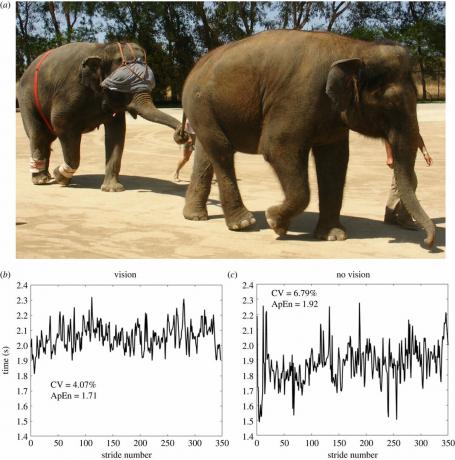
You elephants, majestic giants of nature, are among the most impressive animals, both in terms of size and strength, as well as intelligence.
However, a new study published in the journal Biology Letters, led by Max Kurz, a neuroscientist and physiologist at Boys Town National Research Hospital, and John Hutchinson, professor of evolutionary biomechanics at the University of London, reveals that these magnificent animals rely heavily on vision to maintain their vision. balance. Find out more below!
see more
Is your fan dirty? Learn how to CLEAN IT without having to disassemble it!
Scientists explain what mysterious 'footprints' seen...
Previous research has suggested that large animals are at greater risk of injury from falls, and this risk increases as the size of the animal increases. animal increases.
For elephants, a fall can be fatal due to damage to internal organs or broken bones, making the ability to maintain balance crucial to their survival.
Previous studies had also revealed that different animals use different mechanisms to maintain balance. For example, humans rely on feedback from their limbs and the vestibular system located in the inner ear.
However, the researchers responsible for this new study sought to understand how Asian elephants maintain their balance.

(Image: Biology Letters/reproduction)
Suspecting that vision played a crucial role in this process, researchers collaborated with trainers from Have Trunk Will Travel, a company specializing in training elephants for roles in films and television.
Together they developed giant blindfolds for four Asian elephants and equipped the animals with trackers. GPS on their torsos and accelerometers on their feet. These sensors made it possible to monitor the elephants' movements and gait, including the time needed for each step.
Then, the keepers asked the elephants to walk in single file, forming pairs, along a path. The elephant behind held the lead elephant's tail using its trunk. On some walks, the elephant being followed was blindfolded, while on others it was not.
Analysis of sensor data revealed a significant difference: the timing of the elephants' strides that they were blindfolded was inconsistent and in some cases the elephants had difficulty maintaining their rhythm.
This discovery suggests that elephants depend on vision to time their steps, a fundamental strategy for maintaining balance and, consequently, ensuring their own survival.
This research sheds light on the remarkable adaptation of elephants and how vision plays a crucial role in their ability to navigate and maintain stability in their vast natural world.
Furthermore, it highlights the importance of understanding the needs and abilities of these majestic creatures to ensure their preservation in an ever-changing world.


